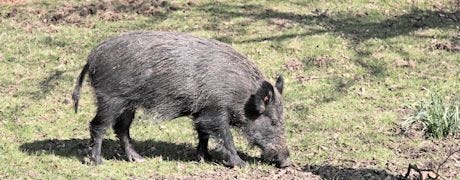
The Kansas eradication program is working to diminish the destructive feral pig population in the southeast region of the state, Kansas Livestock Commissioner Bill Brown assured members of the Kansas Farm Bureau attending the 95th annual meeting of the organization in Manhattan.
Brown said a concerted effort to beat back the feral hog population is the "best news in a long time" as the population has now been reduced to fewer than 400 pigs concentrated in two small areas – one in Bourbon County and one right on the Oklahoma border.

Kansas has been fighting the feral hog population on over one million acres of land, and has reduced the population to less than 400 pigs concentrated in two small areas, one in Bourbon County and one on the Oklahoma border.
"When you realize that the feral pig population in Oklahoma numbers more than 1.7 million and in Missouri the numbers are greater than 50,000, that is truly an amazing feat," Brown said.
The problem with feral hogs
Kansas has battled feral hogs, which are responsible for the devastation of pastures and croplands in area where they roam, with trapping, hunting, helicopter hunts and night vision hunts.
Kansas banned the sport hunting of feral pigs after determining that it causes more harm than good. Hunters typically only kill three of four of a herd of maybe 20 wild pigs, scattering the rest and allowing them to expotentially reproduce.
The feral hogs across the U.S. are a combination of wild hogs that have been around since the 1500s when they were brought to the Americas by the Spanish explorers and escaped domestic hogs, which will crossbreed with the wild animals and which quickly develop feral hog characteristics when living in the wild.
Kansas has been battling feral hogs on more than a million acres of land and has drastically reduced the population of the destructive animals, which are estimated to cause millions of damage to both row crops and pasture lands because of their natural wallowing and rooting characteristics.
About the Author(s)
You May Also Like




